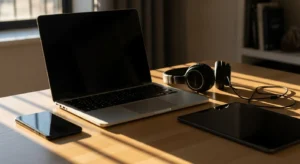Your First Step: A Seven-Day Focus Challenge
We’ve covered a lot of ground, from understanding the mechanics of your attention to building a full suite of rituals and mental models. It can feel like a lot. But remember, the journey from thinking to doing begins with a single, small step. Progress, not perfection, is our goal.
You don’t need more information. You need to take action. To help you do that, we invite you to take on a simple, seven-day challenge. Forget about mastering everything at once. For the next week, focus only on these three actions. Think of it as a pilot program for a more focused you.
1. Define Your “One Thing” Each Morning. Before you open your email or look at your phone, take three minutes. Identify the single most important task that, if completed, would make the day a success. Write it down on a sticky note and put it where you can see it. This single act will bring clarity and purpose to your day before distractions can take hold.
2. Use a Timer for One Work Block. Just once per day, choose a task and set a timer for 45 minutes. During that time, commit to monotasking. Close unnecessary tabs. Put your phone in another room. Give that single task your undivided attention. When the timer goes off, you’re done with the experiment for the day. This will train your “focus muscle” in a manageable way.
3. Perform a 10-Minute Shutdown. At the end of your workday, before you transition into your evening, take ten minutes. Write down any open loops from the day and identify your “One Thing” for tomorrow. Tidy your workspace. Then, officially declare your workday over. This will help you create the mental separation needed for genuine rest and recovery.
That’s it. Three small changes. Commit to practicing them for seven consecutive days. Observe what happens. Notice the small shifts in your clarity, your sense of control, and your ability to move past the initial friction of overthinking. This is not about radically transforming your life overnight. It’s about proving to yourself that you have the power to direct your attention and, by extension, your actions. You can stop overthinking. You have the tools. Now, it’s time to begin.
Disclaimer: The information provided in this article is for educational and informational purposes only and is not intended as a substitute for professional medical or psychological advice, diagnosis, or treatment. Always seek the advice of your physician or other qualified health provider with any questions you may have regarding a medical condition or mental health concern.




